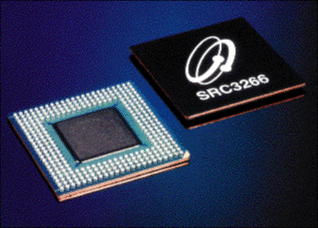IC expands PCI bus to 1,024
slots, 4-Gbyte/s bandwidth
The SRC3266 is a new kind of PCI bridge chip that radically expands
the potential of the PCI bus. Rather than bridging a node to another node
on another PCI bus, the chip acts as a node in a counter-rotating ring
of 16-bit data links, called a Sebring Ring. The chip makes possible up
to 256 PCI buses in a single system, with a total of 1,024 PCI slots.
The chip–called a Sebring Ring Connection (SRC)–packetizes data and
forwards each packet with all header information needed to keep track of
it. Each node stores and forwards each packet that comes in either direction.
Thus each added node adds the capacity of its own buffers to the rings,
allowing aggregate bandwidth to reach 4 Gbytes/s when the maximum
1,024 nodes are in place.

The Sebring Ring controller makes possible fault-tolerant connection
of up to 1,024 PCI nodes and up to 4-Gbytes/s bandwidth.
When a pair of SRCs communicate, they can potentially have the same
throughput as a PCI bus, without tying up the other nodes on the ring.
Thus multiple PCI transactions can occur simultaneously.
The SRC hides all protocol activity from the PCI interfaces, so PCI
masters and slaves interact as if they shared the same PCI bus, with the
same throughput. Part of the hidden protocol hardware is an incomplete
transaction cache (ITC). Fault tolerance, including hot plugging, is achieved
by keeping all information in the ITC until the transaction is acknowledged.
The propagation delay between nodes is about 12 ns, so short runs do
not increase PCI latency. Nodes are assigned addresses automatically as
they are connected. All addressing conforms to the PCI-to-PCI Bridge Architecture
Specification.
The IC is packaged in a 266-pin BGA. For evaluation and development,
the company offers the PCI enhancement ring kit–an eight-slot backplane.
(SRC3266, $59 ea/10,000–samples available now.)
Sebring Systems
Los Gatos, CA
Steve Lau 408-358-7827
http://www.sebringring.com
Advertisement





